|
|
|
Sort Order |
|
|
|
Items / Page
|
|
|
|
|
|
|
| Srl | Item |
| 1 |
ID:
083531
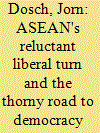

|
|
|
|
|
| Publication |
2008.
|
| Summary/Abstract |
New liberal spaces in several Southeast Asian countries have created a window of opportunity for non-state actors to lobby for the promotion of democracy and human rights in ASEAN. Democratically elected governments cannot ignore the voices of their constituencies and consequently promote liberal values at the regional level. This is mainly the case for Indonesia and the Philippines, and the other member states find it difficult to close their eyes to liberal agendas. Both Jakarta and Manila follow a foreign policy strategy of reforming ASEAN into an organization that actively subscribes to democratic values, as the process of negotiating the ASEAN Charter demonstrated. The charter gives evidence of the group's cautious liberal turn as it explicitly identifies the rule of law, good governance, democratic principles and constitutional government as essential elements of political order. However, it is a long way from the cautious acceptance of general democratic values to the active promotion and regional enforcements of rules based on these norms. In view of the diversity of political systems and ideologies within ASEAN, it comes as no surprise that the association as a collective actor is unable to agree on any meaningful strategy as to how to support and respond to political change. ASEAN's failure to use diplomatic leverage to pressure its member Burma for political reforms is a case in point. At the same time ASEAN does not impede democracy, and future analysts might be looking back on the commitment to core democratic values in the ASEAN Charter as the pre-stage of regional-democracy promotion.
|
|
|
|
|
|
|
|
|
|
|
|
|
|
|
|
| 2 |
ID:
081784
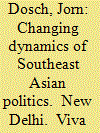

|
|
|
|
|
| Publication |
New Delhi, Viva Books, 2008.
|
| Description |
xi, 271p.
|
| Standard Number |
9788130907994
|
|
|
|
|
|
|
|
|
|
|
|
Copies: C:1/I:0,R:0,Q:0
Circulation
| Accession# | Call# | Current Location | Status | Policy | Location |
| 053466 | 327.59/DOS 053466 | Main | On Shelf | General | |
|
|
|
|
| 3 |
ID:
112541
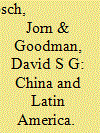

|
|
|
|
|
| Publication |
2012.
|
| Summary/Abstract |
The rise of China is not a new phenomenon. The PRC's growing economic (and in a number of cases also political) involvement in Southeast
Asia and particularly in sub-Saharan Africa has caught the attention of
academics and policymakers alike. However, China's emergence as an
important actor in Latin America has only recently appeared on the radar
screen of the scholarly community and is still an under-researched area.
Eight years have passed since Chinese President Hu Jintao's first tour of
Latin America in November 2004, marking the beginning of a new phase
in Beijing's trans-Pacific relations. The significant boost in Chinese-Latin
American trade provides strong evidence for the importance of this
emerging pattern of interaction. China's trade with the region reached
180 billion USD in 2010, evincing not only an increase of 50 per cent
from 2009 but also a pattern of sharp growth since 2000, when the China-Latin America trade volume stood at just 13 billion USD. By 2007
bilateral trade had already exceeded Hu's original target of 100 billion
USD, set for 2010 (China Daily 2011; Xinhua 2008). The articles in this
issue of the Journal of Current Chinese Affairs bear strong witness to the fact
that this budding relationship has been driven mainly by a mutual desire
to accelerate economic exchange.
|
|
|
|
|
|
|
|
|
|
|
|
|
|
|
|
| 4 |
ID:
053619
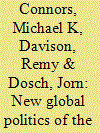

|
|
|
|
|
| Publication |
London, Routledge Curzon, 2004.
|
| Description |
x, 225p.
|
| Standard Number |
0415285623
|
|
|
|
|
|
|
|
|
|
|
|
Copies: C:1/I:0,R:0,Q:0
Circulation
| Accession# | Call# | Current Location | Status | Policy | Location |
| 048600 | 950.43/CON 048600 | Main | On Shelf | General | |
|
|
|
|
| 5 |
ID:
117655
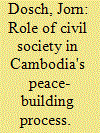

|
|
|
|
|
| Publication |
2012.
|
| Summary/Abstract |
The aid dependence of Cambodian NGOs has resulted in a predominantly donor-driven peace-building process. Notwithstanding some crucial reconciliation initiatives that predate donor involvement and are rooted in local-often Buddhist-traditions, recent key initiatives in the area of transitional justice would not have happened without significant international funding and support.
|
|
|
|
|
|
|
|
|
|
|
|
|
|
|
|
| 6 |
ID:
074734
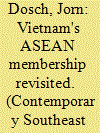

|
|
|
|
|
| Publication |
2006.
|
| Summary/Abstract |
Vietnams membership in ASEAN, which was achieved in 1995, is widely regarded as a powerful symbol and most significant result of Hanois new foreign policy as part of the doi moi renovation process. This article elaborates on the question as to whether ASEAN membership has been as beneficial to the conduct of Vietnams foreign affairs as it is generally assumed. Does ASEAN indeed present a continuous golden opportunity for the management of the countrys international relations or would it be more accurate to view the Association as a golden cage, which offers clear opportunities in terms of the management of regional order but also increasingly restricts Vietnams foreign policy options? The article elaborates on the impact of ASEAN membership on Hanois bilateral relations with China, the United States, and its Southeast Asian neighbours, establishes to what extent Vietnams initiatives towards a peaceful resolution of the South China Sea disputes are in line with ASEANs, discusses Vietnams foreign economic policy interests and also tries to shed some light on the actors and structures in the making of the countrys foreign affairs.
|
|
|
|
|
|
|
|
|
|
|
|
|
|
|
|
|
|
|
|
|